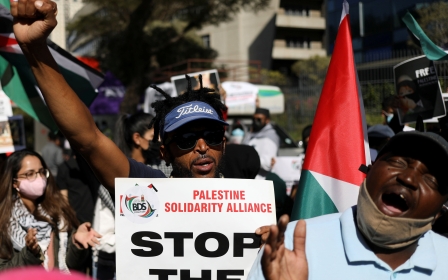Palestinian foreign minister urges African Union to withdraw Israel's observer status

Palestinian Foreign Minister Riyad al-Maliki called on the African Union (AU) to remove Israel's observer status on Thursday, as the bloc met in the Ethiopian capital for the 39th session of the executive council.
In July, AU commission head Moussa Faki Mahamat granted Israel observer status reportedly without consulting all member states. Since then, more than half of the continent's 55 states - including South Africa, Algeria and Egypt - have voiced opposition to the decision.
"The attempt by some to support Israel's application for observer status in the African organization has rightly provoked sentiments of shock and rejection by those who wish to see Africa preserve and defend its proud legacy of successfully defeating racist colonialism and oppression," Maliki said in an open letter, according to the Wafa news agency.
Maliki urged the AU to listen to African leaders who "vehemently protest attempts to override the African Union's Charter and founding principles as well as circumvent the will of the peoples of the continent by fast-tracking a unilateral decision to grant Israel an Observer Status at the African Union".
"Today, I write so that you may hear from the Palestinian people, who have historically and unwaveringly stood on the solid foundation of support to our African sisters and brothers. I write to ask that you stand by Palestine and your peoples' legacy and reject a tacit endorsement of present-day colonialism," the letter added.
Maliki told the block that Israel sees "international law and human rights as impediments and continue to commit war crimes and crimes against humanity have long forfeited any entitlement to have a seat at the African table".
In August, Faki Mahamat responded to the criticism by claiming that the decision fell under his remit and pointed to the more than 40 AU member states which have bilateral relations with Israel.
He also said that accreditation came alongside the union's "unflinching commitment" to the "fundamental rights of the Palestinian people, including their right to establish an independent national state".
Still, earlier this month, three international advocacy organisations - the UK-based International Centre of Justice for Palestinians, Democracy for the Arab World Now (Dawn) in the US and The Legal Resources Center in South Africa - urged the AU to suspend Israel's observer status, citing its treatment of the Palestinians.
"The well-documented crimes and violations of such an oppressive nature that the human dignity and independence of the Palestinian people is decisively suppressed plainly demonstrates that Israel does not embody the values and ideals that the African Union supports and aspires, and that the AU Commission's decision - made without considering the serious concerns of nearly half its membership - was in error," said UK MP Crispin Blunt, who also serves as director of the International Centre of Justice for Palestinians.
Middle East Eye delivers independent and unrivalled coverage and analysis of the Middle East, North Africa and beyond. To learn more about republishing this content and the associated fees, please fill out this form. More about MEE can be found here.





